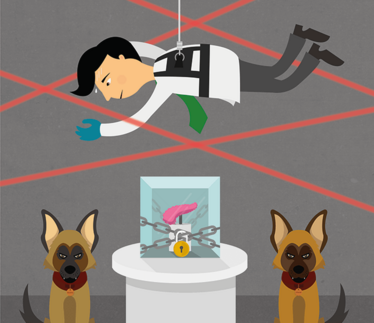Mission: Impossible
Pancreatic cancer is tough to understand, diagnose and treat. Undeterred researchers are on a quest to crack the case.

Although only the 12th most common cancer worldwide (1), pancreatic cancer has gained increasing attention over the last few years. High-profile figures like Steve Jobs and Randy Pausch have put the disease under the spotlight, but despite the increase in research interest, progress remains slow. Why? A combination of factors: the potential causes of the disease are not well understood, screening techniques are imperfect, chemotherapy and radiation treatments have limited success, and the mortality rate is high – only about six percent of patients survive for five years after diagnosis (2), and that number drops to one percent after 10 years (3). But these are not just dismal statistics – they are a call to arms for researchers, and lately, that call has been answered, with new ideas for diagnosis, prognosis and treatment seeming to arrive every day. Here, we speak with some of the scientists at the forefront of this research to learn more about what’s being done. Will we soon see those survival statistics improve? It’s still early days for the new wave of pancreatic cancer breakthroughs, but one thing’s for sure – the promise is most certainly there.
(Chemo)resistance Is Futile by Michael Schubert
Breaching Cancer’s Defenses by Ingunn Stromnes
An Epigenetic Epiphany by Michael Schubert
Building a Better Mousetrap by Michael Schubert
- J Ferlay et al. “GLOBOCAN 2012 v1.0, Cancer Incidence and Mortality Worldwide: IARC CancerBase No. 11”, (2013). Available at: globocan.iarc.fr. Accessed November 23, 2015.
- M Sant et al., “EUROCARE-4. Survival of cancer patients diagnosed in 1995-1999. Results and commentary”, Eur J Cancer, 45, 931–991 (2009). PMID: 19171476.
- Cancer Research UK, “One-, five- and ten-year survival for pancreatic cancer”, (2014). Available at: bit.ly/21d4tyO. Accessed November 23, 2015.

While obtaining degrees in biology from the University of Alberta and biochemistry from Penn State College of Medicine, I worked as a freelance science and medical writer. I was able to hone my skills in research, presentation and scientific writing by assembling grants and journal articles, speaking at international conferences, and consulting on topics ranging from medical education to comic book science. As much as I’ve enjoyed designing new bacteria and plausible superheroes, though, I’m more pleased than ever to be at Texere, using my writing and editing skills to create great content for a professional audience.















